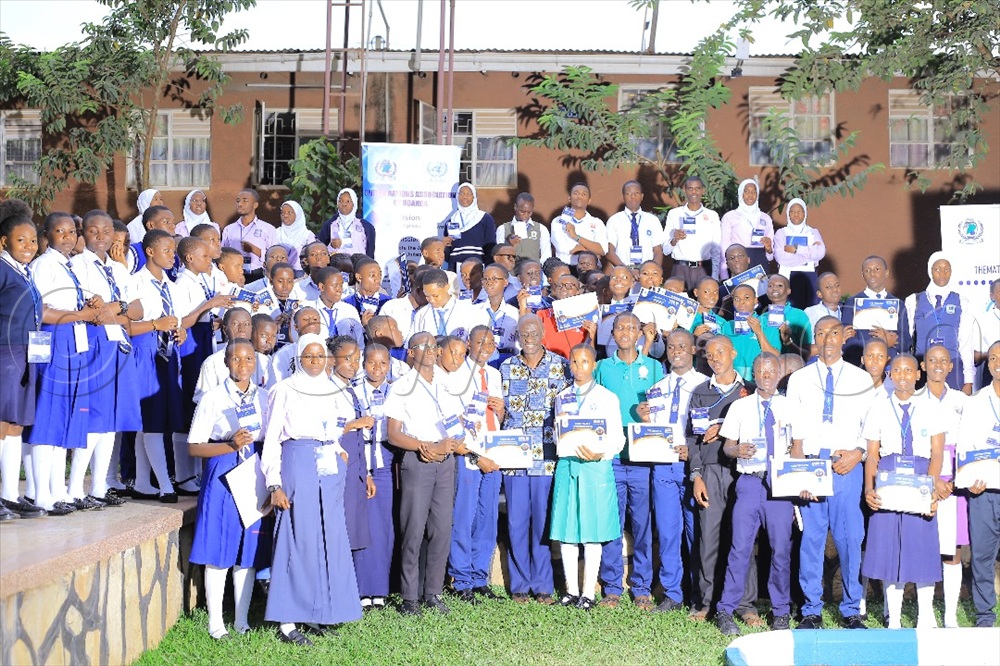Ugandan schools embrace Model UN to cultivate next generation of global leaders
Lindah Asaba, the programmes coordinator at United Nations Association of Uganda (UNAU), said the motivation behind introducing Model UN to secondary schools is to nurture global leaders from the ground up.
During the exercise, students simulate the roles of representatives of countries, organizations, or individuals to collaborate and present global issues. This was during a Mock UN Assembly held at Caltec Academy Makerere on Saturday. (Photos by John Masaba)
________________
A transformative wave in youth education is sweeping across Uganda, with secondary schools increasingly adopting Model United Nations (Model UN) simulations to build global competence, diplomatic thinking, and leadership skills from an early age.
The initiative aligns closely with Uganda’s lower secondary curriculum, which places strong emphasis on communication, critical thinking, and civic responsibility.
Model UN is an educational simulation of the UN, where students learn diplomacy, international relations, global issues, and how the organisation is run.
During the exercise, students simulate the roles of representatives of countries, organisations, or individuals to collaborate and present global issues.
Lindah Asaba, the programmes coordinator at United Nations Association of Uganda (UNAU), said the motivation behind introducing Model UN to secondary schools is to nurture global leaders from the ground up.
“Model UN has traditionally focused on university students, but we realised these students don’t just fall from the sky — they start in high school,” she said.
“If we engage them early, they’ll enter university or the workforce already equipped with skills in diplomacy, negotiation, research, and public speaking.”
Asabawas was speaking during a Mock UN Assembly held at Caltec Academy Makerere in Kampala on Saturday (September 27).
Organised by UNAU, the event gathered students from nearly 50 secondary schools to simulate real UN General Assembly procedures, debate Sustainable Development Goals (SDGs), and draft actionable resolutions addressing critical global challenges.
According to Asaba, the secondary school-level Model UN programme is now in its third year, following previous events hosted at Kyambogo University and Cipriano School.
Caltec Academy hosted the latest session, which she described as one of the most vibrant to date.
The event gathered students from nearly 50 secondary schools to simulate real UN General Assembly procedures, debate Sustainable Development Goals (SDGs), and draft actionable resolutions addressing critical global challenges.
A defining feature of UNAU’s approach is its focus on underserved communities, intentionally steering the programme away from elite international schools.
“We go to schools educating young people from the ghettos — students whose families can’t afford a plane ticket to New York or Nairobi,” Asaba explained, adding that Model UN gives the students "a seat at the global table, right here in Uganda”.
'Rebel against smallness'
During the exercise, students are encouraged to take what they have learnt and apply it in their communities — whether through climate change initiatives, student-led clubs, or peer education programmes.
Richard Tinkasimire Baguma, the secretary general of UNAU, described the experience as more than academic, noting that it is about identity transformation.
He urged participants to rise above limited societal expectations and pursue international ambitions with confidence.
“Don’t be satisfied with small ambitions. Rebel against smallness. Claim your space in the world.”
Baguma emphasised that the programme has already shown results, with past Model UN participants now working in international finance and diplomacy.
He expressed hope that the initiative would reach more schools — funds permitting — and shared plans to scale up via regional training workshops.
Anderson Munji Bajuka, a student at Caltec Academy who served as secretary general of the 2025 mock assembly, said the experience tested and built his leadership capacity.
“I had to listen to diverse arguments and think critically at a high level,” said Bajuka.
“It helped me analyse delegates’ behaviour and make informed decisions. The whole hall was relying on me — that’s pressure, but it made me grow.”
Prisca Nakyeyune, also from Caltec Academy, shared how being unexpectedly appointed as president of a mock UN committee pushed her out of her comfort zone.
"I wasn’t prepared at all — I panicked. But my teacher believed in me, and that gave me the strength to lead, ” she said.
Nakyeyune credited the school’s club culture and the national curriculum for empowering her with the confidence and skills needed to perform.
“This isn’t just a school activity — it’s preparing future leaders to solve global problems,” she added, reflecting on the event’s theme: “Youth for a Healthy Planet: Fighting Tobacco, Protecting Our Planet, Shaping Our Future.”